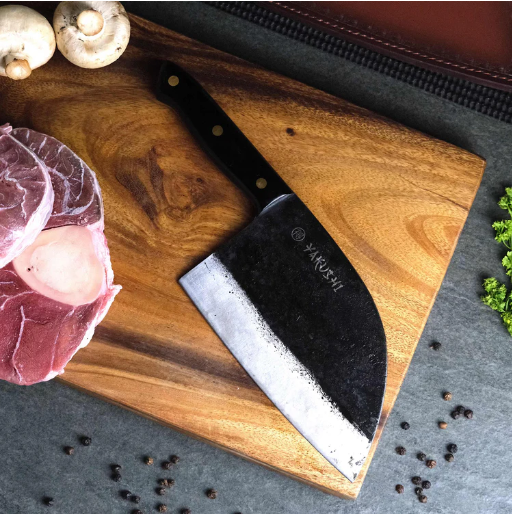Butcher knives and Damascus steel blades are prized possessions for chefs and collectors alike. Their sharpness and durability make them indispensable tools in the kitchen. However, like any other tool, they require proper care and maintenance to ensure their longevity and performance. In this guide, we’ll explore the essential steps to keep your butcher knives and Damascus steel blades in top condition.
Understanding Your Knives
Before delving into maintenance, it’s crucial to understand the materials and construction of your knives. Butcher knives are typically made of high-carbon stainless steel, known for its strength and edge retention. Damascus steel blades, on the other hand, are crafted using a traditional technique that involves folding and forging multiple layers of steel to create a distinctive pattern.
Cleaning
Proper cleaning is the cornerstone of knife maintenance. After each use, wash your knives by hand with warm, soapy water and a non-abrasive sponge. Avoid soaking them for prolonged periods, as this can lead to corrosion, especially in Damascus steel blades. Dry them immediately with a soft cloth to prevent water spots and stains.
Avoid putting your knives in the dishwasher, as the harsh detergents and high heat can damage the blades and handles over time. Additionally, be cautious when handling sharp knives during cleaning to prevent accidents.
Sharpening
Maintaining a sharp edge is essential for optimal performance. Use a sharpening stone or honing steel to regularly sharpen your knives. For butcher knives, a honing steel is typically sufficient for minor edge maintenance. Hold the knife at a 20-degree angle against the steel and draw it across in a sweeping motion, alternating sides.
Damascus steel blades may require more attention due to their hardness. Use a fine-grit sharpening stone to gently sharpen the blade, following the original bevel. Take care not to over-sharpen or apply too much pressure, as this can damage the delicate pattern and edge of the blade.
Storage
Proper storage helps prevent damage and ensures the longevity of your knives. Store them in a knife block, magnetic strip, or blade guard to protect the edges from dulling and the blades from chipping. Avoid storing knives loose in drawers, as they can rub against other utensils and cause nicks or scratches.
For Damascus steel blades, consider storing them in a climate-controlled environment to prevent moisture buildup, which can lead to corrosion. A wooden knife block or display case can provide both protection and an aesthetic touch for showcasing your prized blades.
Maintenance Tips
In addition to regular cleaning, sharpening, and storage, here are some additional tips to keep your butcher knives and Damascus steel blades in top condition:
- Use cutting boards made of wood, plastic, or bamboo to protect the knife edge and prevent dulling.
- Avoid cutting hard objects like bones or frozen food with your knives, as this can cause chips or fractures in the blade.
- Oil the blades of Damascus steel knives periodically with food-safe mineral oil to prevent rust and maintain their luster.
- Inspect your knives regularly for any signs of damage or wear, such as chips, cracks, or loose handles, and address them promptly.
Conclusion
Caring for butcher knives and Damascus steel knife is essential to preserve their sharpness, durability, and beauty. By following these maintenance tips and incorporating them into your kitchen routine, you can ensure that your knives remain reliable tools for years to come. Treat your knives with care, and they will continue to serve you well in all your culinary endeavors.


